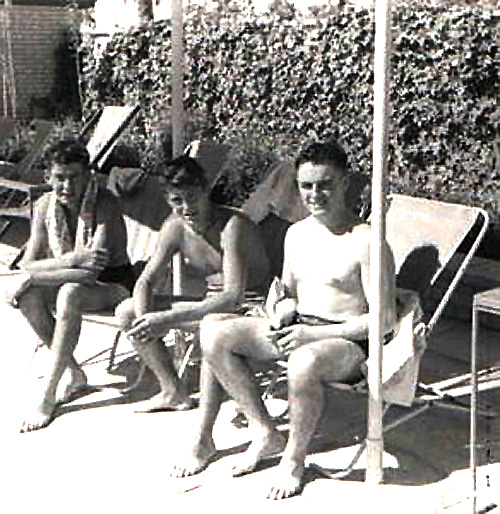
Ambrose Jones (right)

Ambrose Jones (right)
When I was relieved from duty as an apprentice on the motor tanker 'London Pride' at Rotterdam in late 1954, my replacement was Ambrose Jones. I knew him only for some hours. About 50 years later he contacted me via the Internet, where we had both posted accounts of our times at sea in that company. Unfortunately he is no longer with us, having stopped answering e-mails around 2010 or so.
At the time of writing this (2017) his web pages are still on-line at the major seafarer website at http://www.oldsalts.org.uk/index-_ambrose_lof.html
There are some items I add and others I wish toI back up. We conferred about many facts of life aboard a tramp oil tanker, and about the people we knew in common (at least half a dozen). We also shared experiences of our times on board ship. See our experience of extraordinary phosphorescence in the sea
We both signed on as apprentices (aka 'officer cadets') at the Shipping Federaton (Leadenhall St.), which shows the lowly status and the very minimal imbursement, among other things:-

Ambrose also wrote about life on the 'London Pride' in which we both sailed, he taking over with the same crew I had sailed with for the past 3-4 months:-
"Life on the "LONDON PRIDE"
Cargo was loaded in warm climates but frequently discharged in cool conditions, initially when loading we apprentices took cargo 8.6. and temperatures so that the quantity of cargo loaded could be properly computed.
When approaching the discharge port initially starting a week before arrival we
took temperatures once a day then twice a day, in rough weather, we could not
take all tank temperatures without possibly getting sea water into the oil - or oil
spraying out of the ullage plug and settling as dirty brown spots on the bridge front
white paint - just beforea head office "Marine Superintendant" came to inspect the
ship and report of Chief Officers competence for promotion - No way.
The practice we had was one apprentice - clean job with gloves and spanner open all ullage plugs, dirty apprentice with 4 or 6 thermometers from forward one into each tank, call out temperatures of each tank, to clean apprentice who wrote them in the book which he would take on completion to the Chief Officer, whilst dirty apprentice resecurred the ullage caps and got clean.
This time I was on "dirty" and Alan taking the temps in the book and standing on
the flying bridge - We were unable to take temps 2,3,4 starboard due to our
shipping seas. At the material time I was at 4 centre and making my way to 4 port
when Alan shouted, what I do not know - l was deaf and undewater, no sense of
direction when bump both shoulders were numb - my head was stuck overside
looking at white water crashing up the shipside and water pouring past my ears
and chest under pressure from in board where my body was under water - after the
ship rolled once or twice the pressure decreased enough for me to get my head out
of the Panama lead which had acted as a collar - stand up and try and find the
thermometer for 4 port.
The moral to be drawn and learnt was 'Never turn your back on the sea' - it can throw a green one at you without warning.
Mr Putt ex Eagle oil - who sailed on 26,000 ton tankers in the mid/late 1920's called San Bemardo, San Felix, San Fernando - currently we thought 24,000 dwt tankers were planned and large for 1954. The Pride when discharging had failure to discharge 4 centre, with 6 feet of crude oil left to discharge. Putt donned a smoke helmet and found that we had an 10” hole in a crossover pipe which we could not isolate. Putt found the missing piece of plate bound it crosswise over the hole, lagged the lot with sacking, lashed the lot covered with gunk and sat on it until suction was possible, When the cargo was down to 2ft the stripping pump took over, the Chief Officer came out - but was in discomfort for some days afterwards caused by crude oil having scorched the areas of tender tissue.
Years later when Master he went off his head, firing the ships .45 pistol and only his “Tiger” could handle him - all on board were terrified and the Sparks
radioed ahead to the Australian port for medical and police assistance, thinking it would be "shoot out time". Initially when the medias and police
boarded the situation could have gone either way but suddenly he went quiet and “helpful" going ashore with the police without a fight."